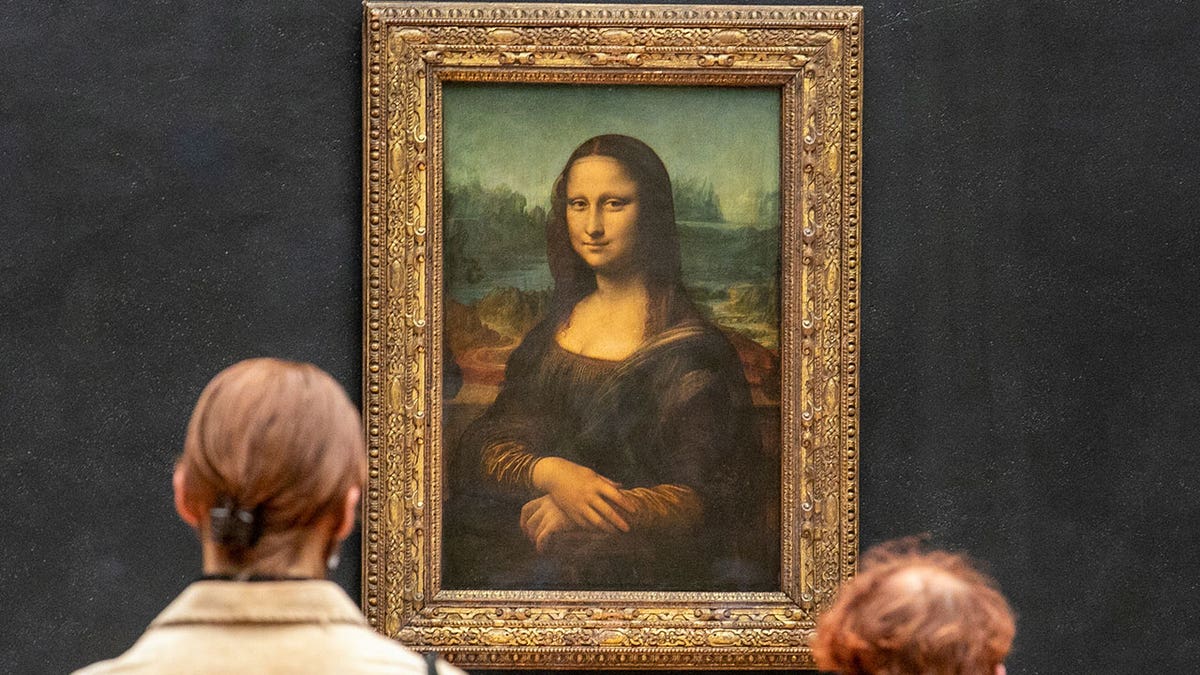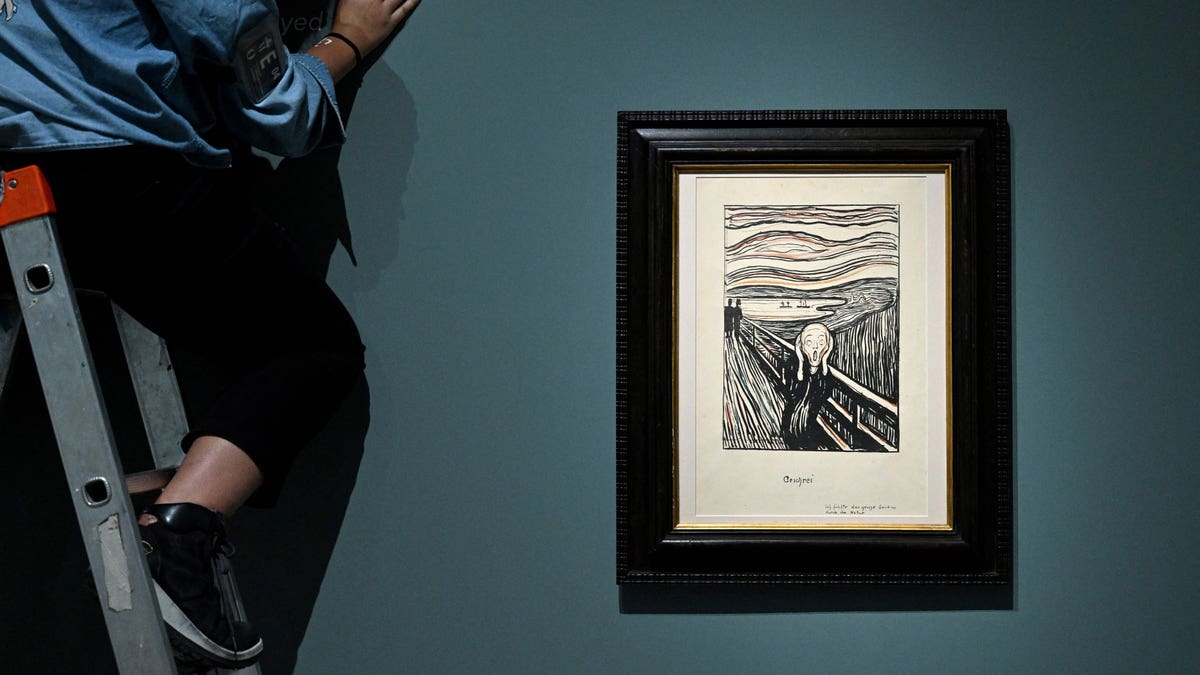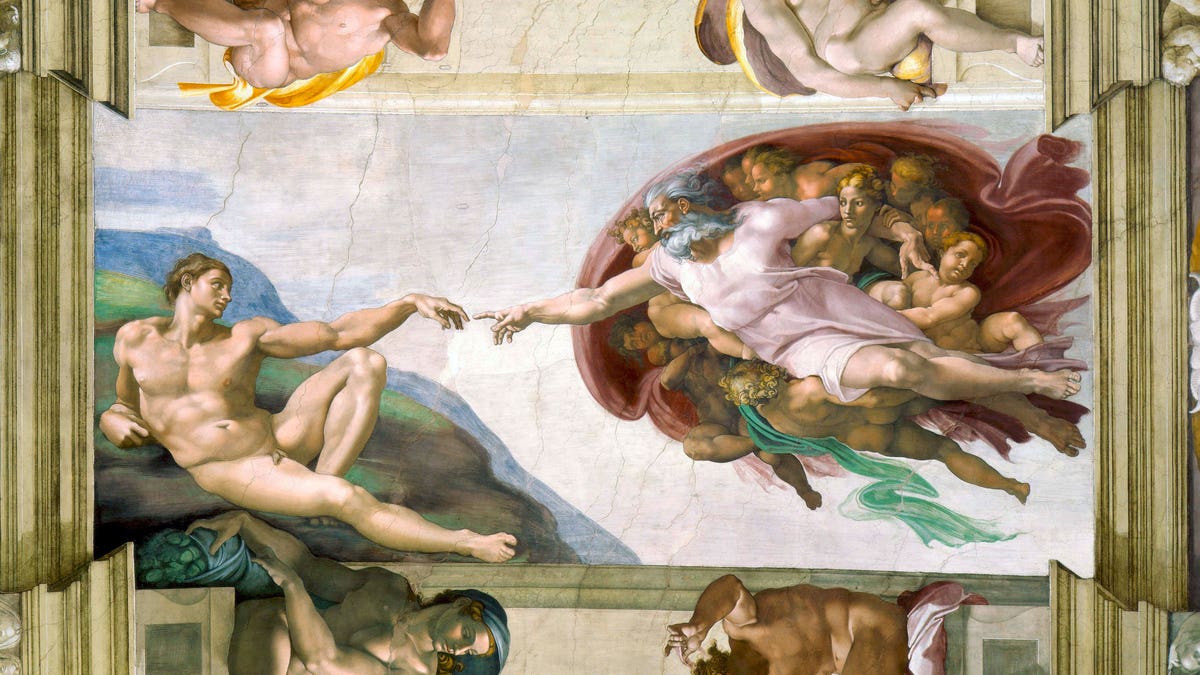Climate activists throw potatoes at $110 million Monet painting
'Outnumbered' panelists criticize the 'ridiculous' demonstrations.
The greatest paintings usually magnify the beauty and morals of the civilizations that produced them, inspiring countless other artists, writers and satirists for centuries to come.
Artists such as Vincent van Gogh, Michelangelo and Leonardo da Vinci produced work that has been replicated in modern media through parodies and historical references.
In addition, the public can still view their art in museums around the world.
STUDENT'S STUNNING PAINTINGS ON BOOK EDGES GO VIRAL ON TIKTOK
Here are just a few of them.
- "Mona Lisa"
- "Starry Night"
- "The Scream"
- "Girl With a Pearl Earring"
- "Creation of Adam"
- "The Persistence of Memory"
- "Washington Crossing the Delaware"
1. 'Mona Lisa'
For over a decade, da Vinci crafted one of the world's most recognizable paintings, the "Mona Lisa," which symbolizes the Italian Renaissance. It's the artist's magnum opus.
The oil painting depicts Lisa del Giocondo, an Italian noblewoman, and was constructed with the model staring directly forward.
The piece has been immortalized across centuries in modern media through various parodies and references.

The public can still view the "Mona Lisa" by visiting the Louvre in Paris. (Marc Piasecki/Getty Images)
Da Vinci began working on the painting in 1503 but made changes to the work throughout his career until 1517.
After he died in 1519, it is believed that one of Da Vinci's pupils, Salai, inherited "Mona Lisa," however, the painting eventually made its way to France after being acquired by King Francis I and continues to reside in the country on display at the Louvre in Paris.
2. ‘Starry Night’
Van Gogh was not well-known for the entirety of his artistic career and committed suicide, destitute, at 37.
However, after his passing, Van Gogh's work gained steam as the public began viewing him as a misunderstood genius.
FRENCH SITE WHERE VINCENT VAN GOGH CREATED HIS LAST PAINTING MAY HAVE BEEN REVEALED
"Starry Night" is considered his most well-known painting, which he began working on in 1889. It depicts the night sky over an asylum in southern France.
The unique oil texture of the painting, as well as the use of blue and yellow paint, has attracted onlookers for centuries. "Starry Night" can be viewed publicly at the Museum of Modern Art in New York City.
3. ‘The Scream’
"The Scream" is one of the most recognizable depictions of human fear and anxiety in Western art's history.
The work is part of a collection of pieces done by Norwegian painter Edvard Munch in 1893, but the painting depicting an agonized face screaming at the audience while two blurred figures appear in the background is the most popular.

"The Scream" is part of a collection of paintings that shows a figure shouting, symbolizing human anxiety and fear. (Getty Images)
Munch's work in the series was paramount to the development of the impressionist art movement, and had a long-standing influence throughout modern art history.
"The Scream" has been parodied countless times in Western media, and is currently valued in excess of $100 million.
GALLERY DISCOVERS VAN GOGH SELF-PORTRAIT BEHIND OTHER PAINTING
You can view the different works in "The Scream" collection at the National Museum and Munch Museum in Oslo, Norway.
4. ‘Girl With a Pearl Earring’
Another iconic female portrait – perhaps only second to the "Mona Lisa" in terms of recognizability – is "Girl With a Pearl Earring," completed by Dutch artist Johannes Vermeer in 1665.
The oil canvas centers on a young girl wearing a blue and gold turban with a large pearl earring on her left earlobe.
The painting is referred to as a "tronie," a word used in the golden age of Dutch art to describe work that depicts exaggerated features or facial expressions from the subjects of the painting.
The painting is currently displayed at the Mauritshuis in The Hague, Netherlands.
5. ‘Creation of Adam’
Michelangelo, an Italian painter and icon of the Renaissance, painted "The Creation of Adam" on the ceiling of the Vatican's Sistine Chapel between 1508 and 1512.
The religious meaning and symbolism behind the painting have made it a masterpiece in Western art history.

"The Creation of Adam" shows God and Adam, the first human God created, touching fingers. (Getty Images)
The work depicts God and Adam, the first man created in Christianity, nearly touching fingers with their arms outstretched.
The painting is done in a realistic tone, with the subjects' physical characteristics greatly magnified to the audience.
6. ‘The Persistence of Memory’
In 1931, Salvador Dalí produced one of the most iconic images of the 20th century's Surrealist art movement – and of modern art writ large – with "The Persistence of Memory," a bizarre piece depicting four clocks melting along the coast of Catalonia.
CLICK HERE TO SIGN UP FOR OUR LIFESTYLE NEWSLETTER
Dalí, a notorious eccentric, is speculated to have conceived of the painting as a response to Albert Einstein's theory of relativity. Other accounts note Dalí's "paranoiac-critical method" of creating art, which entailed him deliberately inducing psychotic hallucinations.
The piece has been held in the Museum of Modern Art's collection since 1934.
7. ‘Washington Crossing the Delaware’

Emanuel Leutze's "Washington Crossing the Delaware" is currently displayed at the Metropolitan Museum of Art in New York City. (Andrew Lichtenstein/Corbis via Getty Images)
Completed in 1851 by German artist Emanuel Leutze, "Washington Crossing the Delaware" quickly became one of the Revolutionary War's most iconic depictions, as well as a lasting symbol of American patriotism.
Inspired by the anti-monarchy movements proliferating across Europe at the time, Leutze conceived of the painting as a means of paying homage to liberal reformists at home by invoking powerful imagery of the American example set just a few decades prior.
CLICK HERE TO GET THE FOX NEWS APP
The oil-on-canvas work, a duplicate of the original, was completed in 1850, but destroyed in an Allied bombing of Germany during World War II.
It is currently displayed at the Metropolitan Museum of Art in New York City.
Phillip Nieto contributed reporting.
For more Lifestyle articles, visit www.foxnews.com/lifestyle.










































